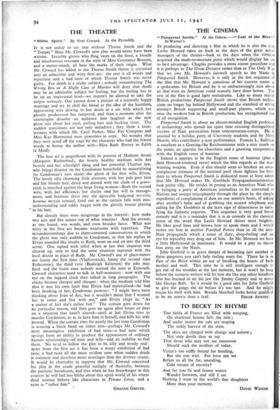THE THEATRE
"Blithe Spirit." By Noel Coward. At the Piccadilly.
IT is not unfair to say that without Thorns Smith and the " Topper " films Mr. Coward's new play would never have been written. Invisible ghosts who fling vases on the floor, a blonde and mischievous revenant in the style of Miss Constance Bennett, and a motor-smash, all bear the marks of their origin. What Mr. Coward has added to the Thome Smith theme is crammed into an admirable and witty first act: the rest is all words and repetition and a bad taste of which Thorne Smith was never guilty. For death is a tricky subject ; nobody remembering The Wrong Box or A Slight Case of Murder will deny that death may be an admirable subject for fooling, but the fooling has to be on an impersonal level—we mustn't be allowed to take the corpse seriously. One cannot draw a picture of a normally happy marriage and try to chill the blood at the idea of the harmless, aggravating wife driving to her death in a car with which her ghostly predecessor has tampered, and then a moment after the catastrophe dissolve an audience into laughter as the new ghost sets about her rival, pulling hair and hacking shins. The sudden transitions are not only maladroit ; they show a taste- lessness with which Mr. Cecil Parker, Miss Fay Compton and Miss Kay Hammond were powerless to cope. No wonder that they were acted off the stage by the character who had the fewest words to betray the author with—Miss Ruth Reeves as Edith (a Maid).
The first act is magnificent with its portrait of Madame Arcati (Margaret Rutherford), the hearty healthy medium with her bicycle and her schoolgirl slang and her powerful Thurber jaw, who brings disaster on the Condoman household by materialising (to C,ondoman's eyes alone) the ghost of his first wife, Elvira. The lovely silly charming little creature, with her pale grey face and her blonde hair, dried and dusted with the chalk of a grave- yard, is matched against the large living woman—Ruth the second wife, with her efficiency, her clarity and her will to manage- ment, and between these two the agreeable badgered novelist, homme moyen sensual, tired out as the curtain falls with mis- understanding and oddly happy with the ghostly breeze playing in his hair.
But already there were misgivings in the interval: how make two acts and five scenes out of what remains? And the answer, as one found, was words, and even broader farce. What was witty in the first act became wearisome with repetition. The misunderstandings due to three-cornered conversations in which the ghost was only audible to Condoman, so that his replies to Elvira sounded like insults to Ruth, went on and on into the third scene. One sighed with relief when at last that situation was cleared up, only to find the same situation repeated with the local doctor in place of Ruth. Mr. Coward's use of place-names are funny the first time (Vladivostock), funny the second time Folkestone), the third time (Budleigh Salterton) the joke mis- fired and the fouth time nobody noticed the aunt at Exmouth. Coward characters used to talk in half-sentences : now with one eye on the laggard clock they talked in long paragraphs. The cracks became cheaper and cheaper : when the medium told him that it was his own fault that Elvira had materialised—he had been thinking of her, Condoman protests : "I might have been thinking about Joan of Arc, but it wouldn't mean that I wanted her to come and live with me," and Elvira chips in, "As a matter of fact she's rather fun." The curtain goes down for no particular reason, and then goes up again after hours or days on a situation that hasn't altered—until at last Elvira tries to murder Condoman, so as to have him to herself, and kills his wife instead. When the curtain rises for nearly the last time Condoman is wearing a black band on either arm—perhaps Mr. Coward's most meaningless exhibition of bad taste—a bad taste which springs from an ability to produce the appearances of ordinary human relationships—of man and wife—and an inability to feel them. No need to follow the plot to its silly and wordy end: apart from the first act it has been a weary exhibition of bad taste, a bad taste all the more evident now when sudden death is common and dissolves more marriages than the divorce courts. It would be charitable to suppose that Mr. Coward conceived his play in the crude peaceful sunlight of Australia, between the patriotic broadcasts, and that when he has beerr-longer in this country he will feel less blithe about this spirit world of his where dead women behave like characters in Private Lives, and a saint is "rather fun."
GRAHAM GREENE.


























 Previous page
Previous page